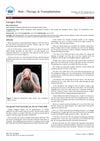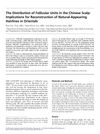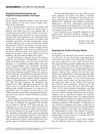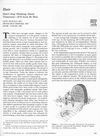 January 2024 in “International Journal of Health Science”
January 2024 in “International Journal of Health Science” Hormonal implants have many side effects that often outweigh their benefits.

The guide suggests using keratin fibers and wigs to help hair look thicker or hide hair loss.
 January 2020 in “Asian journal of applied science and technology”
January 2020 in “Asian journal of applied science and technology” Good nutrition is crucial for health and preventing disease, and supplements can help prevent nutrient deficiencies.
 July 2017 in “British Journal of Dermatology”
July 2017 in “British Journal of Dermatology” The document concludes that scalp conditions have various causes and can present in many different ways.
 February 2015 in “Current problems in dermatology”
February 2015 in “Current problems in dermatology” The document provides a comprehensive guide for dermatologists to diagnose and treat hair loss.
 January 2015 in “Hair therapy & transplantation”
January 2015 in “Hair therapy & transplantation” Hair restoration greatly improved George's confidence and self-identity.
 November 2013 in “John Wiley & Sons, Ltd eBooks”
November 2013 in “John Wiley & Sons, Ltd eBooks” The document concludes that accurate diagnosis of male and female gonadal disorders is crucial for effective treatment and better patient outcomes.

Recent discoveries have improved our understanding of hair loss, but challenges in treatment and knowledge among specialists still exist.
 January 2009 in “International Journal of Trichology”
January 2009 in “International Journal of Trichology” Dr. Shyam B Verma encourages more scientific research on hair disorders and criticizes the unscientific hair care market in India.
 October 2002 in “Dermatologic Surgery”
October 2002 in “Dermatologic Surgery” The document concludes that careful planning, efficient use of every hair graft, and setting surgical priorities are crucial for successful hair restoration surgery.
 June 2002 in “Dermatologic Surgery”
June 2002 in “Dermatologic Surgery” Chinese scalps have fewer hair clusters than Caucasians, and transplanting 30 clusters per square centimeter creates a natural-looking hairline for bald Chinese individuals.
 December 1999 in “Dermatologic Surgery”
December 1999 in “Dermatologic Surgery” Experts discussed sedation, hair transplant techniques, and called for respectful professional communication.
 December 1998 in “The American Journal of Cosmetic Surgery”
December 1998 in “The American Journal of Cosmetic Surgery” Hair restoration should focus on quality and value, not cost, to maintain the field's reputation and ensure patient satisfaction.

research Hair
May 1995 in “Dermatologic Surgery” Smaller hair grafts in transplants offer better cosmetic results and more styling options, but challenges like thinning and limited coverage remain.
 July 1975 in “Archives of Dermatology”
July 1975 in “Archives of Dermatology” Stopping tetracycline can lead to the disappearance of flat warts.
 May 2002 in “British Journal of Dermatology”
May 2002 in “British Journal of Dermatology” Hair loss caused by longer latent hair cycle and sudden miniaturization, not gradual follicle size reduction.
 October 2000 in “Annals of Dermatology”
October 2000 in “Annals of Dermatology” Finasteride effectively treats hair loss in men with minimal side effects.
 April 2021 in “Journal of The European Academy of Dermatology and Venereology”
April 2021 in “Journal of The European Academy of Dermatology and Venereology” Age, hair loss duration, menopause, and specific treatments affect hair density and caliber in female hair loss patients.
 829 citations,
May 2007 in “Nature”
829 citations,
May 2007 in “Nature” Hair follicles can regrow in wounded adult mouse skin using a process like embryo development.
 403 citations,
November 2005 in “Journal of Endocrinology”
403 citations,
November 2005 in “Journal of Endocrinology” Dehydroepiandrosterone (DHEA) is a prohormone important for producing sex steroids and has potential health benefits.
 239 citations,
July 2002 in “Clinical and Experimental Dermatology”
239 citations,
July 2002 in “Clinical and Experimental Dermatology” Low iron and L-lysine levels can cause hair loss in women, and increasing these nutrients can reduce hair shedding.
 171 citations,
July 2007 in “Journal of Investigative Dermatology”
171 citations,
July 2007 in “Journal of Investigative Dermatology” A substance called DKK-1 increases in balding areas and causes hair cells to die when exposed to DHT.
 171 citations,
October 1990 in “Alcoholism/Alcoholism, clinical and experimental research”
171 citations,
October 1990 in “Alcoholism/Alcoholism, clinical and experimental research” The document concludes that the exact way alcohol causes harm to fetal development is unknown, but it significantly affects nutrient transport to the fetus and a safe level of alcohol during pregnancy is not determined.
 164 citations,
April 2008 in “Cochrane library”
164 citations,
April 2008 in “Cochrane library” Current treatments for alopecia show no significant long-term benefits.
 144 citations,
August 2019 in “Cells”
144 citations,
August 2019 in “Cells” The WNT signaling pathway is important in many diseases and targeting it could offer new treatments.
 139 citations,
February 2010 in “The journal of allergy and clinical immunology/Journal of allergy and clinical immunology/The journal of allergy and clinical immunology”
139 citations,
February 2010 in “The journal of allergy and clinical immunology/Journal of allergy and clinical immunology/The journal of allergy and clinical immunology” Transplant success has improved with better immunosuppressive drugs and donor matching.
 138 citations,
March 2001 in “Clinics in Dermatology”
138 citations,
March 2001 in “Clinics in Dermatology” Hair loss can significantly affect a person's self-esteem and body image, especially in young people, those who value their looks highly, and women.
 132 citations,
January 2017 in “International Journal of Molecular Sciences”
132 citations,
January 2017 in “International Journal of Molecular Sciences” Fat-derived stem cells show promise for skin repair and reducing aging signs but need more research for consistent results.
 127 citations,
December 2007 in “Journal of Investigative Dermatology”
127 citations,
December 2007 in “Journal of Investigative Dermatology” Mice hair growth patterns get more complex with age and can change with events like pregnancy or injury.
 124 citations,
July 2012 in “Archives of Dermatological Research”
124 citations,
July 2012 in “Archives of Dermatological Research” Targeting androgen receptors could be a promising way to treat skin disorders with fewer side effects.






























